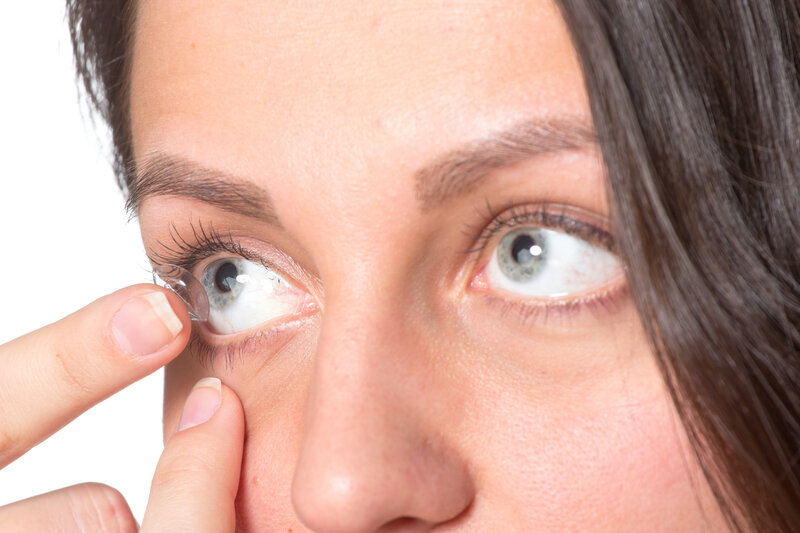Posted by: Atlantic Eye Institute in EVO Visian

Contact Lens Intolerance And How To Relieve It
Many of our patients who have refractive errors enjoy wearing contact lenses instead of glasses for a variety of reasons. Unlike glasses, contacts don’t alter a person’s appearance, and many of our patients simply find contacts to be a more convenient option than glasses. For all of their benefits, however, contact lenses can sometimes become uncomfortable or irritating to wear, even for long-time wearers. As eye doctors, we refer to this as contact lens intolerance (CLI), and it can affect up to 15% of contact lens wearers.
What Is Contact Lens Intolerance?
Contact lens intolerance is a general term used to describe pain, irritation, or discomfort experienced while wearing contact lenses. This can be an immediate reaction to wearing contacts, but it can also impact people who have been comfortably wearing contact lenses for months or even years. There are a number of potential causes of CLI, including:
- Reaction to contact lens care products
- Improper contact lens-wearing regimen
- Duration of lens wear
- Dry eyes
- Allergies
- Diet and nutrition
- Lens materials
- Poor contact fit
Some people only experience occasional contact lens intolerance, while others encounter intolerance so severe that they simply can’t wear contact lenses anymore.
5 Ways To Relieve Contact Lens Intolerance
For most patients, contact lens intolerance is not a permanent situation. Still, we don’t want any of our patients to experience discomfort in their quest for clearer vision. If you struggle with contact lens intolerance that is especially uncomfortable or frequent, you should discuss the issue with one of our eye care professionals. In the meantime, though, there are some steps you can take to try to ease your discomfort.
5. Evaluate wear and care
For many of our patients, contact lens intolerance can be attributed to the products they use to care for their lenses. These products may contain preservatives that can cause hypersensitivity. If you have recently begun to struggle with CLI and have also switched to a different solution, that could be the culprit.3
Other common sources of contact lens intolerance are sleeping in your lenses, wearing contacts for too long, or not making sure they are properly cleaned and disinfected every time you insert them. Make sure you always follow your doctor’s instructions when it comes to contact lens wear and care.
4. Lubricate your eyes
Sometimes, the source of contact lens intolerance is simply dryness. Try using over-the-counter artificial tears or lubricant eye drops indicated for use with contact lenses and see if that provides you with relief of CLI symptoms, if only temporarily.
3. Diet and nutrition
Again, dry eye is a common source of contact lens intolerance. Did you know that your diet and nutritional habits may be impacting your tear production or the quality of your tears? Speak with your eye doctor to help identify ways supplementing your diet may help you produce more, quality tears to keep your eyes comfortable.
2. Switch to glasses
If you suffer from frequent or long-term contact lens intolerance, you may need to consider switching to glasses, at least a few days a week. This could give your eyes a rest from contacts and help alleviate uncomfortable symptoms.
1. Vision correction surgery
Of course, the ideal way to ease your contact lens intolerance is to eliminate the need for any corrective lenses at all. At Atlantic Eye Institute, we offer a range of vision correction surgical options, including LASIK, PRK, and EVO Visian ICL Lenses. All of the vision correction options we offer have favorable safety profiles and are associated with a high rate of patient satisfaction, and we can have you enjoying clear—and comfortable—vision soon after a procedure that is approximately 20-30 minutes.
Contact Atlantic Eye Institute
If you are frustrated by symptoms of contact lens intolerance or are ready to explore more permanent vision correction solutions, we are here to help. Please contact Atlantic Eye Institute today to schedule your consultation with a vision and eye care expert.
1. American Refractive Surgery Council. Why contact lens wearers need their annual eye exam. Available: https://americanrefractivesurgerycouncil.org/contact-lens-problems-it-might-be-contact-lens-intolerance/. Accessed March 29, 2021. 2. Dumbleton K, Caffery B, Dogru M, Hickson-Curran S, Kern J, Kojima T, Morgan PB, Purslow C, Robertson DM, Nelson JD; members of the TFOS International Workshop on Contact Lens Discomfort. The TFOS International Workshop on Contact Lens Discomfort: report of the subcommittee on epidemiology. Invest Ophthalmol Vis Sci. 2013 Oct 18;54(11):TFOS20-36. 3. American Academy of Ophthalmology. Contact lenses: when a solution is the problem. Available: https://www.aao.org/eyenet/article/contact-lenses-when-solution-is-problem?august-2012. Accessed March 3, 2021.



